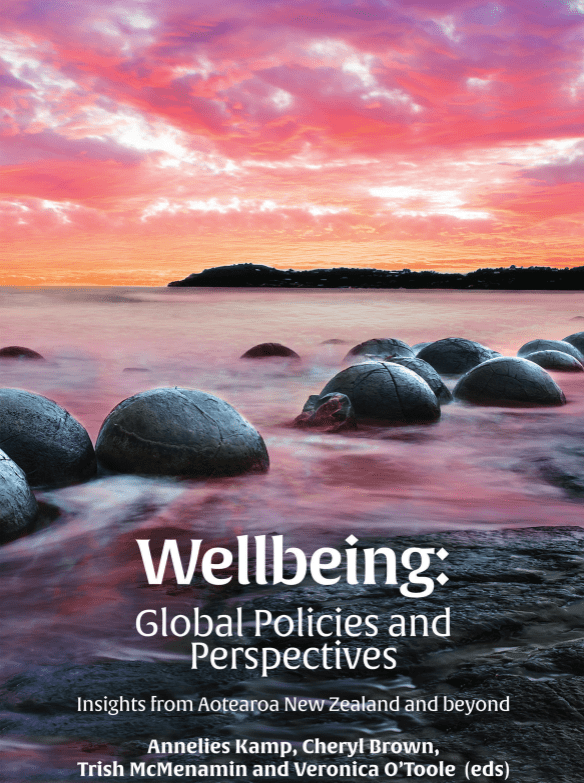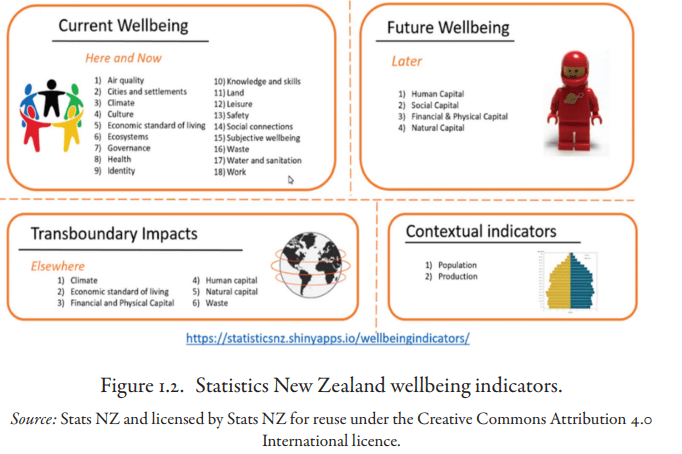
In This article
- What is Well-being?
- Is Well-being measurable?
- Well-being in the context of Aotearoa New Zealand
What is well-being? Happiness? Life satisfaction? After decades of research, it seems no one can define what well-being is as it is never a simple concept of a single existence. It is a complex construct of a range of factors and researchers often try to measure it.
Associate Professor, Billy Osteen at the University of Canterbury. states that it may be more worthwhile to count well-being than define it. For a long time, the thought was, well-being was equal to money. People will be thought to have more well-being than somebody who didn’t make the same amount of money. However, people will still feel happy when their income reaches a level where they can afford a nice house, and a way to transport themselves, or even being able to take a vacation now and then, which doesn’t require a huge amount of money. In other words, earning more money or accumulating more wealth does not mean more well-being. Therefore, measuring pure money and well-being doesn’t tend to go hand in hand. There’s other stuff going on. In addition, GDP was also not designed to assess well-being, which involves different dimensions and aspects of human life.
In New Zealand, there is still an ongoing debate about what is well-being. Is it really measurable? And more importantly, why it is necessary to measure well-being? And more importantly, why is it necessary to measure well-being? The book Wellbeing: Global Policies and Perspectives, Insights from Aotearoa New Zealand and beyond, reviews everything there is to know about well-being. Myth or magic? You’ll have to read on to find out!

What is Well-being?
The first chapter is really like a short history of well-being. Since it is a question that has been asked for thousands of years, it’s nothing new. Though it is not conducted with a firm answer, it is undeniable that well-being is never a simple but a complex combination of factors such as
living purposefully, feeling a sense of accomplishment, feeling good, and building authentic relationships (Bentea, 2019; Seligman, 2011).
Some scholars argue that culture has an important impact on how people define well-being (Oishi and Gibert, 2016; Tove 2018). In other words, the meaning of well-being differs in different cultures and contexts. For example, in the western tradition, well-being is often associated with individual achievement and satisfaction, while eastern cultures tend to place greater emphasis on collective well-being and harmony.
Nevertheless, the authors in this book conclude that there is no definite answer to it. The important thing is that you can read it and come to a conclusion of your own. It is important to think about well-being as a more complex thing than a simple thing.
Is Well-being measurable?
Bhutan is often credited as being the first country to measure well-being, as they have been using the concept of Gross National Happiness (GNH) as an alternative to Gross Domestic Product (GDP) since the 1970s. Other examples of measures that go beyond economic performance include efforts in the United Kingdom, India, and France.
Researchers advocate for appropriate and accurate ways of conducting research – but when it comes to measuring well-being, it is always hard to find a certain criterion to count it. Unlike GDP, which can be measured using objective economic data, well-being is subjective and varies from person to person. It takes a lot of creativity and probably more time and attention. Qualitatively, it requires researchers to figure out different sides of well-being in the census people filled out. It is important to recognize that well-being is a complex and multifaceted concept that may be difficult to fully capture using quantitative methods.
So, is well-being measurable – yes, it can be, but it takes a lot more effort, which could be more in-depth! As it may be difficult to fully measure, it requires a more holistic approach that takes into account the social, cultural, and environmental factors that contribute to well-being.
Well-being in the context of Aotearoa New Zealand
Aotearoa New Zealand is known for its holistic approach to promoting well-being. The five main well-being objectives guide the government’s budget decisions and deliver a slew of benefits for the environment, work, health, Maori and Pacific peoples, and child well-being. Specifically, there are 18 indicators the New Zealand government came up with, including air quality, water quality, and good education, which also map onto the sustainability goals.

In 2019, New Zealand launched a “Wellbeing Budget” that allocates funds based on five key areas of well-being: mental health, child well-being, indigenous populations, environment, and infrastructure. In the book, each chapter reflects the different contexts around well-being, such as well-being in early childhood education in Aotearoa New Zealand. Explore more details in the e-book here!
Bentea, C. C. (2019). ‘Approaches of Happiness and Well-Being in Psychology’, International Multidisciplinary Scientific Conference on the Dialogue Between Sciences & Arts, Religion & Education, 3(3), 257-64.
Kamp, A., Brown, C., McMenamin, T., & O’Toole, V. (2023). Wellbeing : Global policies and perspectives: Insights from aotearoa new zealand and beyond. Peter Lang.
Oishi, S., and Gilbert, E. A. (2016). ‘Current and Future Directions in Culture and Happiness Research’, Current Opinion in Psychology, 8, 54-8.
Tov, W. (2018). ‘Well-being Concepts and Components’. In E. Diener, S. Oishi, and L. Tay (eds), Handbook of We—Being. Salt Lake City, UT: DEF Publishers. https://www.nobascholar.com/books/I, accessed 30 August 2022.